Mysteries of the Monarchy: War Powers
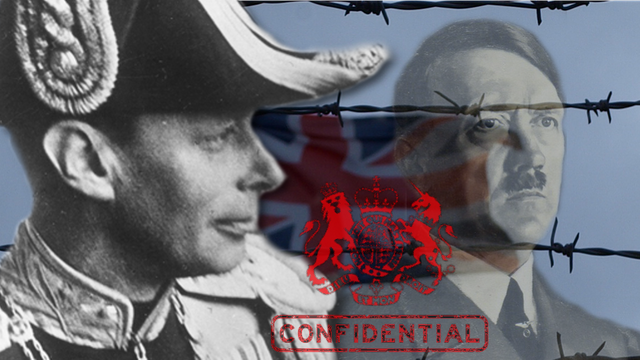
EVERYONE KNOWS that the Royal Family changed their name to "Windsor" to renounce their German roots, during the First World War. What has never been noticed before is how that ancestral connection led to an audacious deception two decades later, as the United Kingdom entered the Second World War. And the reason I can tell you about it today is because of a controversy that embroiled British Prime Minister Theresa May when she declared war on Syria earlier this year. It's a very tangled tale indeed.
Mrs May's constitutional conservatism
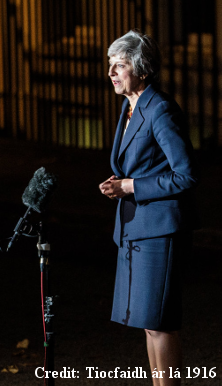
VERY BRIEFLY, the Syrian war controversy was over the British Government's powers to declare war. Mrs May (pictured right) personally took the decision that committed troops to the conflict. This caused an upset, because the last time Britain had declared war on anyone was under Prime Minister Tony Blair, in 2003.
For reasons of his own (which I won't go into here), Mr Blair put the matter to a vote in Parliament, and that vote was passed. The result was that Britain joined the invasion of Iraq that deposed Saddam Hussein.
The thing is, Mr Blair didn't need to put the matter to Parliament at all. He had the power to declare war all on his own – which is the path Theresa May chose 15 years later.
Mr Blair's decision to get Parliamentary approval for the Iraq War had been an innovation, and Mrs May simply decided to go back to the old way of doing things. That's the way the British Constitution works, in practice. But how did Prime Ministers acquire the power to declare war in the first place?
Defence of the Realm
THAT LAST QUESTION MIGHT seem stupid to American readers, whose democracy is far less old-fashioned than Britain's. But the United Kingdom is still exactly that -- a kingdom. In Britain's system of constitutional monarchy, the King or Queen is Commander-in-chief of the armed forces. This isn't an obscure technicality: to this day, members of the army, navy, and air force all swear an oath of allegiance to the reigning monarch. It's a constitutional principle that dates far back in time, when Kings personally led their armies and fought in battle – and sometimes lost their crowns as a result.
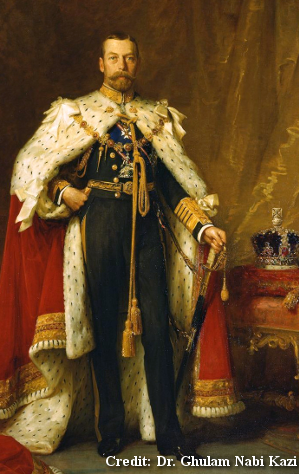
Monarchs stopped leading their troops in combat hundreds of years ago. The last British King to do so was George II in 1743. But the power to actually declare war stayed firmly on the throne.
It was this power that meant that Britain's 1914 entry into the First World War was declared by King George V (pictured right).
The War was announced through the Privy Council, which was, and still is, the surviving part of feudal Government, from the days when Kings ruled in person. The result of George V's declaration of war was a disaster for everyone involved.
The First World War turned into a slow-motion bloodbath and the public's awareness of the Monarchy's central role ("For King and Country!") turned the pointless slaughter into an indelible stain on the Monarchy's reputation. And that's where we come in.
Trusting Adolf Hitler
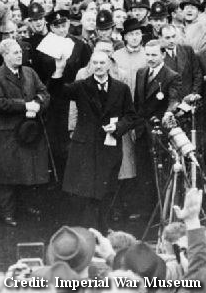
WHEN THE Second World War was declared, the Monarchy was nowhere to be seen. Prime Minister Neville Chamberlain had pursued a policy of appeasing Nazi Germany while promising the British public "peace for our time." The famous "piece of paper" waved by Chamberlain in September 1938 (pictured left) was Hitler's signed promise not to invade anywhere else. Chamberlain - an old-fashioned man of honour - had just returned from Munich, where he had met Hitler for a private summit.
The Royal Family were so keen to be associated with peace, that they made a joint balcony appearance with Chamberlain at Buckingham Palace. For constitutional reasons, this was actually pretty outrageous: the Monarchy is meant to stay above and outside politics. Crowds gathered to cheer the news that Britain wasn't going to be sleepwalking into another European massacre like the last one. As we know, it didn't turn out like that at all.
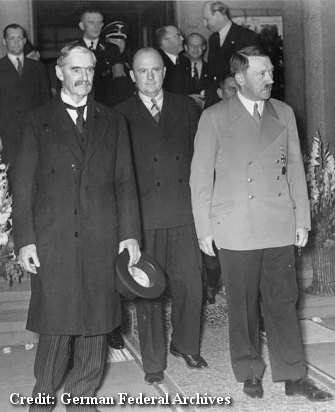
By September 1939, the game was up. Hitler had strung Chamberlain along at their Munich conference (pictured right), and now war couldn't be staved off any longer.
On 3 September 1939, Chamberlain announced that his Government's efforts to secure peace had failed and Britain had been dragged into its second European war in 25 years. Chamberlain has gone down in history as a disaster of a Prime Minister, whose weakness and gullibility nearly betrayed Britain.
And it's at this point that you might have noticed something odd. If the First World War had been declared by the King, why was the Second World War declared by the Prime Minister alone?
No-one has ever bothered to ask this question, never mind try to answer it. There has been consistent silence on the subject for 79 years. There was never a change of law. No questions were raised in Parliament. No newspaper ever reported it. But the facts are undeniable: the British Monarchy had silently relinquished the power to declare war.
Instead, the power was placed in the hands of the Prime Minister serving at that time. And that power of life and death has stayed with the Prime Minister to the present day.
The King is Dead

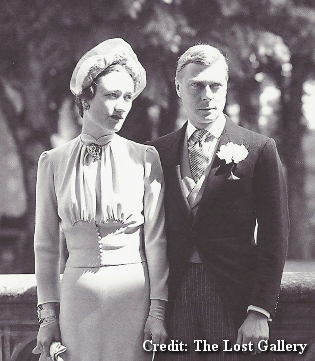
THE SIMPLE ANSWER appears to be that it was the King that had changed. George V (closeup, above) had died in 1936.
For reasons we won't go into now, his heir, Edward VIII, was forced to abdicate within the year.
Edward (pictured right) was replaced by his younger brother, who became George VI.
George V had been a terrifying old-fashioned patriarch of a kind that is now hard to imagine. A good indicator of his personality is the fact that he vowed: "I was frightened of my father, and I am damn well going to see to it that my children are frightened of me." He was as good as his word, too.
George VI, on the other hand, was a man of a far milder temperament than his tyrannical father. His eldest daughter – the current Queen Elizabeth II – has never spoken of her deceased father (pictured below left) with anything but the warmest affection and fondness. (He had notorious rages, which the young Princess Elizabeth called his "gnashes", but they always passed quickly once the pressure had been released).
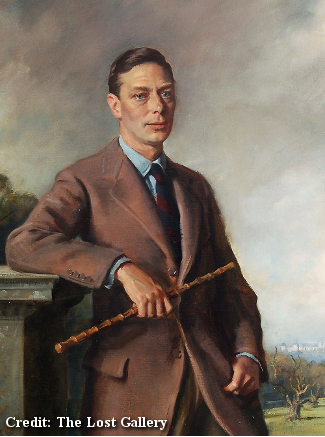
It seems that after the constitutional crisis of his brother's abdication, George VI decided not to risk damaging the Monarchy's reputation again.
First, George VI publicly associated himself in 1938 with Chamberlain's efforts to secure peace.
This put the Monarchy firmly in line with public sentiment, which was a national desire to avoid – by any means necessary -- a repeat of the horrors of the First World War.
But in 1939, when appeasement collapsed, the Monarchy stepped back into the shadows. The responsibility was shouldered by Neville Chamberlain himself.
Chamberlain the scapegoat?
NEVILLE CHAMBERLAIN never spoke about the sudden reversal in his political fortunes that occurred as Britain was drawn into the Second World War. The Prime Minister was a man born in the 1800s, and complaining about the King's unfairness would have been unthinkable. If King George VI (pictured meeting Chamberlain, below right) ever consulted his aides about the abandonment of his war powers, not a trace of it has been made public.
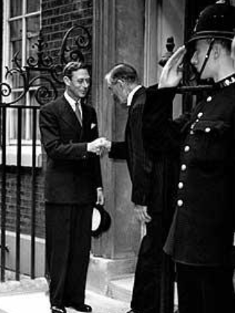
But the decision definitely was made, and maybe there is a secret record of King George VI's momentous decree, safely sealed away in the Royal Archives at Windsor Castle. Maybe, one day, that record will be made public.
But don't hold your breath. The Royal Family's various manoeuvres during the Second World War are still a matter of great sensitivity in Britain. I will examine these secrecy-shrouded episodes in future Steemit posts about the mysteries of the Monarchy.
⦿ All Rights Reserved
Curated for #informationwar (by @commonlaw)
Our purpose is to encourage posts discussing Information War, Propaganda, Disinformation and other false narratives. We currently have over 8,000 Steem Power and 20+ people following the curation trail to support our mission.
Join our discord and chat with 200+ fellow Informationwar Activists.
Join our brand new reddit! and start sharing your Steemit posts directly to The_IW!
Connect with fellow Informationwar writers in our Roll Call! InformationWar - Contributing Writers/Supporters: Roll Call Pt 11
Ways you can help the @informationwar
Congratulations @garrickalder! You received a personal award!
You can view your badges on your Steem Board and compare to others on the Steem Ranking
Do not miss the last post from @steemitboard:
Vote for @Steemitboard as a witness to get one more award and increased upvotes!